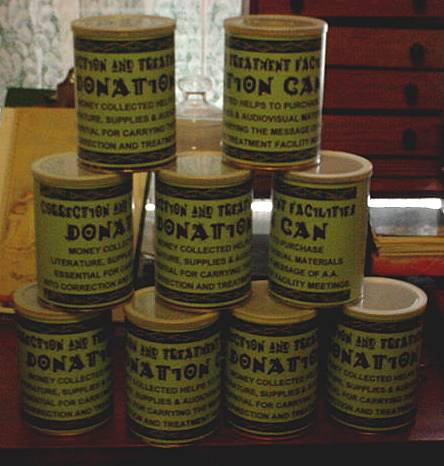Self Support Quiz
1. What year was A.A. founded.
1935
2. In what year was the General Service Conference Started?
The New York office had greatly expanded its activities, and these now consisted of public relations, advice to new groups, services to hospitals, prisons, Loners, and Internationalists, and cooperation with other agencies in the alcoholism field. The headquarters was also publishing "standard" A.A. books and pamphlets, and it supervised their translation into other tongues. Our international magazine, the A.A. Grapevine, had achieved a large circulation. These and many other activities had become indispensable for A.A. as a whole.
Nevertheless, these vital services were still in the hands of an isolated board of trustees, whose only link to the Fellowship had been Bill and Dr. Bob. As the co-founders had foreseen years earlier, it became absolutely necessary to link A.A.'s world trusteeship (now the General Service Board of Alcoholics Anonymous) with the Fellowship that it served. Delegates from all states and provinces of the U.S. and Canada were forthwith called in. Thus composed, this body for world service first met in 1951. Despite earlier misgivings, the gathering was a great success. For the first time, the remote trusteeship became directly accountable to A.A. as a whole. The A.A. General Service Conference had been created, and A.A.'s over-all functioning was thereby assured for the future.
3. When were the traditions introduced?
In 1946, in the Fellowship’s international journal, the A.A. Grapevine, these principles were reduced to writing by the founders and early members as the Twelve Traditions of Alcoholics Anonymous. They were accepted and endorsed by the membership as a whole at the International Convention of A.A., at Cleveland, Ohio, in 1950.
4. When were the concepts introduced?
The Twelve Concepts for World Service were written by A.A.’s co-founder Bill W., and were adopted by the General Service Conference of Alcoholics Anonymous in 1962. The Concepts are an interpretation of A.A.’s world service structure as it emerged through A.A.’s early history and experience. The short form of the Concepts reads
5. What rich potential A.A. patron stated “I am afraid that money will spoil this thing,”.
John D. Rockeffer Jr.
6. Area 83 has prudent reserve, how many months operating expenses is this based on?
12 months
7. “Now, where do A.A.’s services – worldwide, area, local – fit into our scheme of things?” asks Bill W. in an October ___1967__article in the A.A. Grapevine. “Why should we provide these functions with money?” According to Bill, “The answer is simple enough. Every single A.A. service is designed to make more and better Twelfth Step work possible, whether it be a group meeting place, a central or intergroup office … or the world service Headquarters. (what year was this printed in the A.A. Grapevine, please fill in the blank.)
8. What is the limit on how much an individual can donate to G.S.O.?
2,000
9. The A.A. Birthday Plan suggest we contribute _$1.00_ for each year we have been sober. (fill in the blank)
10. What tradition speaks to groups being Self Supporting through their own contributions.
The 7th Tradition
11. Which legacy of A.A. do the concepts represent ?
Service
12. What month is the General Service Conference held ?
April
13. Who attends the General Service Conference representing Area 83?
The Delegate
14. When anyone, anywhere, reaches out for help __I___ want the hand of A.A. always to be there. And for that: ___I___am responsible. (Fill in the blanks)
15. Who determines your group’s prudent reserve?
Each group is autonomous there for it is determined by group conscious usually at a business meeting.
16. What pamphlet gives suggestions on how to split contributions between district, group, area and GSO?
Self Support: Where Money and Spirituality Mix.
17. Self-Support: Where Money and __Spirituality_ Mix.
Saturday, March 24, 2007
Subscribe to:
Post Comments (Atom)



1 comment:
FALSE PROPHET
It is important to note that Bill Wilson's faith system was not based on Jesus Christ and Him crucified; nor is there any mention of Jesus Christ being the Savior from his sin. Both he and Bob Smith (co-founder of AA) embraced and promoted a variety of spiritual experiences, which included practicing spiritualism and conversing with the dead (which the Bible forbids) and being heavily involved in séances. Wilson also acted as a medium or channeler. It was while involved in these types of religious experiences, not Biblical Christianity, that Wilson developed his Twelve Steps (Pass It On, pp 156, 198, 275, 278). Nowhere in the 12 steps does it say that you should quit drinking, or help anyone else to quit drinking, either. Nowhere do the words SOBRIETY, RECOVERY, ABSTINENCE, HEALTH, HAPPINESS, JOY, & LOVE appear in the 12 Steps. The word ‘alcohol’ is only used once, when it was PATCHED into the 1st Step for the word “sin.” But Wilson wrote “ We are powerless over ‘alcohol’… Oxford Group Slogan; “We are powerless over sin & have been defeated by it.Oxford group soul surgery techniques called for augmentation of guilt leading to the conversion experience. The alcoholics had learned, through their own conversion, a different method, augmentation of fear with an initial diminution of guilt. “It’s not your fault it’s a disease. There is nothing you can do about it. You’ll die unless you believe.” When a person was properly convinced & reached a point of proper desperation, guilt was then applied to bring about conversion of God control. These new groupers [Steppers] were motivated not primarily by guilt, but by fear. The other groupers [Steppers] being god controlled through guilt would use guilt to manipulate others.
PEACE BE WITH YOU
MICKY http://michael-micky.blogspot.com/
Post a Comment